What Size Pool Heater Do You Need? Read our guide to the different types of Pool Heaters before making your choise.
There comes a day in the life of every pool owner when they’re sick and tired of swimming in water that’s as frigid as a Siberian lake. This is when they make the momentous decision to purchase a pool water heater.
Pool heaters allow you to swim in total comfort even when temperatures are a bit on the chilly side. They also lengthen your swimming season so you can take a dip earlier in the spring, right as the first flowers of the year blossom forth. Pool heaters also make possible the exquisite pleasure of splashing around when the crisp scent of autumn is in the air.

If you’ve had it up to here with pool water so cold it makes the hair on the back of your neck stand up, consider buying a pool heater. However, before you can get one up and running, it’s helpful to know how to calculate heater size.
The Four Types of Pool Heaters
Gas Pool Heaters
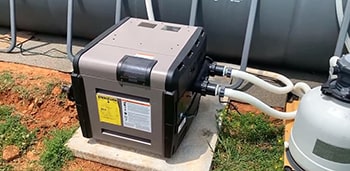
A gas-powered heater is the most powerful type and has the highest BTU output. The range on these units goes from 100,000 BTUs all the way up to 500,000.
Most heaters fueled by gas are 85 to 90% efficient. Therefore, if your pool warmer has a rating of 350,000 BTU with 88% efficiency, you’ll get an output of 308,000 BTUs. Unfortunately, efficiency plummets over time due to time and the elements taking their toll.
If you want to swim when it’s cold outside or need your pool heated quickly, consider getting a gas heater with a higher BTU rating. In cases like these, propane might be your best bet because it generates more heat and warms up more quickly.
Boosting your heater’s capability also means you’ll need to upgrade your gas line size. Let’s say your 150,000 BTU heater had a line three-quarters of an inch in diameter, and you’re graduating to a 400,000 BTU heater. In that case, you’ll need a line that’s a quarter and an inch in width.
While there are natural gas and propane pool heaters, natural gas pool heaters tend to be less expensive. In fact, it can be up to 80% cheaper in some areas of the country. On the other hand, propane produces more energy per gallon than natural gas, so you get more bang for your buck.
Electric Pool Heaters
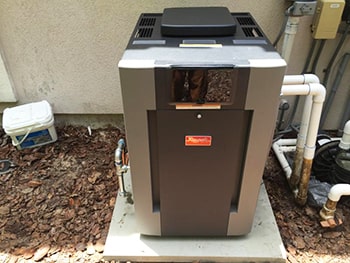
Electric pool heaters contain a heating element, otherwise known as a resistor. Electricity flows through the element and generates enough heat to get your pool water to a comfortable temperature.
Resistive electric pool heaters are generally extremely effective at transferring heat and have very little or no loss. While these models are fast-acting, warming up a large swimming pool with an electric heater is more expensive than natural gas heaters. That’s because electricity costs more than natural gas in most areas of the country.
Solar Pool Heaters
Solar panel pool heaters have the lowest BTU output of any type. However, they also have the lowest operating cost because instead of generating heat, they harness the solar energy to get your pool all nice and toasty.
Pool Heat Pumps
Unlike resistive heaters, heat pumps for pools don’t convert electricity to heat. Instead, they extract residual warmth from the air surrounding a pool and pump it into the water. This makes them kind of like reverse air conditioners. While heat pumps give off less heat than gas or electric heaters, they’re amazingly energy efficient.
Heater Size Calculations Based on BTUs
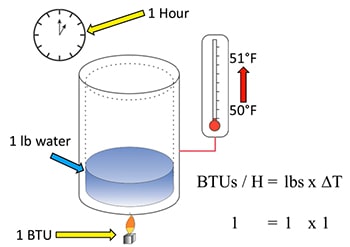
Before you start your computations, you need to know what BTUs (British Thermal Units) are. Heat generating ability for pool heaters is measured using this unit. This is the heat required to raise the temperature of one pound of water by one degree Fahrenheit.
You also need to know the volume of your pool, your ideal swimming temperature, and the coldest outside air temperature you’ll be swimming in. You should also figure out how fast you want your pool to heat up.
For instance, if you have a swimming pool without an attached hot tub and it’ll remain at a constant temperature, you probably don’t care about heating speed. On the other hand, if you have a hot tub connected to your pool, there might be times when you want to get your water heated as quickly as possible.
Our calculations will start with the weight of your pool water. To determine this, use this formula:
For example, if your pool has 15,000 gallons, you’d multiply that by 8.3, which equals 124,500 pounds of water you’ll need to heat. It takes one BTU to heat one pound of water to one degree. This means you’ll need to buy a pool heater with a minimum rating of 124,500 BTUs.
Next, take the coldest outside air temperature you’ll be swimming in. Let’s say it’s 64 degrees Fahrenheit. If your ideal swimming temperature is 82 degrees, the temperature differential your heater needs to bridge is 18 degrees. Take the size of your pool in gallons and multiply it by the BTU constant (8.3) and the temperature differential. In our example, this would be:
15,000 x 8.3 x 18 = 2,241,000 TOTAL NUMBER OF BTUS NEEDED
Next, divide this number by how fast you want the water to heat up. If you’re okay with a 24-hour time frame, the calculation will look like this:
2,241,000/24 = 93,375 BTUs per hour
Solar and Heat Pump Pool Heaters
Solar-powered and heat pump-style heaters heat up water more slowly than gas and electric models, which is precisely why these heaters won’t work in colder climates. With these units, it’s best to forget about speed and just calculate the amount of heat energy to maintain water temperature.
Here’s the formula for that:
Going back to our example, we have:
25 x 27 = 675 square feet of surface area
675 x 18 x 12 = 145,800 BTUs
Heat pump-style pool heaters typically have BTU ratings of 75,000 to 125,000, while solar-powered models are lower than this. Solar and heat pump-style pool warmers wouldn’t work in our example because the temperature differential is too great.
Now, let’s pretend that the pool is in a warmer climate and that the coldest outside air temperature is a balmy 72 degrees instead of 64. Here’s what the numbers would look like then:
In this case, a heat pump-style or solar heater probably would work.
Calculating by Surface Area
Some pool experts say you shouldn’t size a pool heater by volume because most pool heat is lost through surface evaporation. According to these individuals, the best way to size a pool heater is by calculating the surface area in square feet.
If you have a rectangular pool, you’ll multiply length time width. If it’s round, you’ll multiply 3.14 times the radius of the pool squared. If your pool is oval, multiply 3.14 times length times width times 0.25. If it’s kidney-shaped, run an imaginary line down the middle and measure the widest point in each half. Plug those numbers into the following equation:
Calculate the minimum BTU size by dividing the pool surface area by three and multiplying that by 1,000. In our example, that would be 225,000 BTUs. While this is the minimum recommended size, you might want to go higher if your overnight pool temperatures drop to bone-chilling levels.
How a Solar Pool Cover Helps
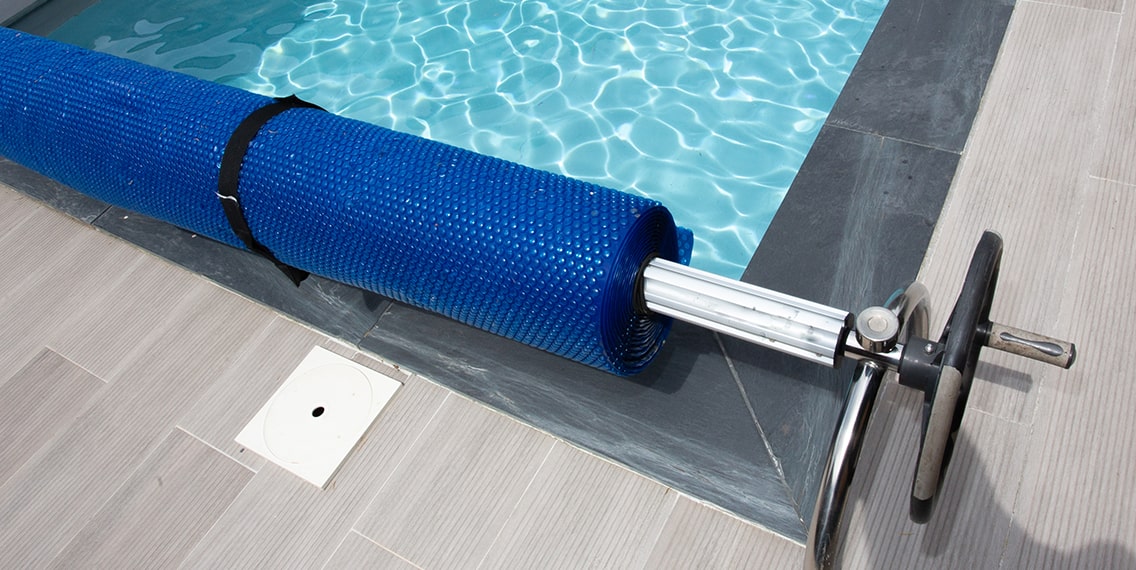
If you own a pool heater, you owe it to yourself to buy a solar pool cover. Most heat loss occurs at the pool’s surface, and a pool cover reduces this by up to 70%. By using one, you might be able to get away with a heater with a lower BTU rating, and this could help you save hundreds of dollars a year.
Final Thoughts
For pool owners who want to take a dip in water that’s pleasantly warm instead of water so cold it could have come from an Alaskan glacier, pool heaters are the ultimate in both comfort and convenience. However, you need to get one rated for the correct BTU output.
If you don’t, you might find yourself with an underperforming unit. In that case, you’ve just wasted your money. To prevent that from happening, use the information in this article to find the perfect pool heater for your needs.

Pool Maintenance Tips & Tricks
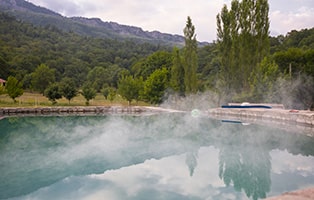

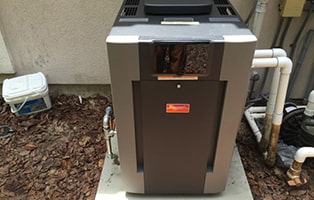
Good article except for I correct statement.
“ That’s because much of the energy generated is lost when transferring it from the heating element to the water.”
Is untrue. Resistive heaters are generally extremely effective at transferring heat and have very little or no loss. However. Electricity is very expensive for the heat it is equivalent to. Natural gas has very high energy content and is much less expensive in most areas.
Heat pumps do not convert electricity to heat. They literally move or pump heat from one place to another, even from the colder outdoors to warmer pool.